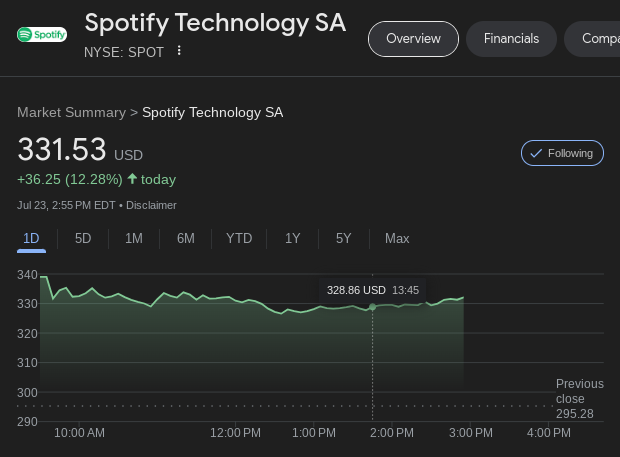The Product Vs. The Stock
It is tough to judge a product's value and its effect on the company's stock price. You might, in your own bubble, conclude a stock will change the world. Based off your own experience loving the product, you buy the stock. Sometimes this approach can work, but it is no silver bullet. In this post, I'll consider 2 examples of unique value adding products that did actually translate into rising share price, Spotify (SPOT) and Crocs (CROX).
I've learned many times how easy it is to overpay for a stock. If you blindly buy a stock because you are a customer, you can get burned buying at excessive valuation multiples or buying right before the business hits a down cycle.
The best companies warrant buying at high multiples, but it's an elite group. As we saw with the recent Crowdstrike fiasco, a company's reach is a double-edged sword that can be self-inflictive. Risk is always present in stocks. With that said, let's move on to cases where this did work out... so far.
SPOT
Since 2012, I used Spotify happily. In 2020, applying this product --> stock logic, I bought my first SPOT shares at $158. I voluntarily pay each month to have a full library of songs on my phone. Why not own this company? I got in and watched it soar in 2020 and 2021.
In 2021 the stock price ballooned and I bought 2 more shares at $320. Then 2022 arrived and SPOT fell under $100. Seeing a DCA opportunity in fall 2022, I scooped more shares around $75-$100, doubling down on my position.
Since then, Spotify has shown they are the real deal. Monthly active users continue to grow. Revenue was up 20% in Q1 2024. A savvy shift into podcasts has made the product even more compelling. Shares are back over $300. The company reached profitability in Q3 2023 for the 1st time in a year. Spotify is flexing its pricing power by raising subscription prices.

Wall Street is starting to notice what Spotify is building. After today's earnings report the stock jumped 12%. They're striking the right chords with Wall Street and delivering consistent growth. They look more and more like a strong business who will be flowing cash for a long time.
CROX
CROX shoes stand out. They're comfortable, versatile and as funky as you want them to be. They're taking the world by storm. But how profitable could a shoemaker be? One thing that sets CROX apart is that most of its shoes are variations from the same core design. That seemingly boosts their profit margins.
Although I've never tried Crocs myself, I see them everywhere I go. They are a phenomenon that many people don't want to acknowledge. Most of my life, they were an afterthought. I often remarked in the past how polarizing they were amongst the people I knew. Either you wore Crocs or you saw them as hideous, with very few in between. It turns out there are enough of the former to keep Crocs growing profitably for the past 10 years.

After seeing the stock dip under $90 in fall 2023, I decided to roll the dice on it. I bought more from $100-$140. It's up 40% year to date. Now, it's my 7th largest stock position. Some might prefer to invest elsewhere than shoes. Q1 2024 net income was $792.6 million compared to $540.2 million in 2022. 32 million pairs of Crocs were sold in Q1 2024, up 3% YoY. I believe this is an extraordinary shoe product with compounding and growth potential.
One pleasant surprise has been their management. They are locked in and performing well after following the company the past year. They sold 119.6 million pairs of shoes worldwide for the Crocs Brand. This is a great product that seems to have half the Earth hooked, and the other half disgusted. Crocs acquiring HEYDUDE left an overhang that should lift with the strength of another established brand finding its footing.
Product success does not equal stock success. However, it gives me more conviction to see the product frequently when out in the world. If you are experiencing the value of the product first hand, it's valuable to see how it performs its function in the real world. This product guided perspective of stock picking has worked sometimes in my experience. However, beware of your own echo chamber. It's easy to overestimate the value delivered and its future value.
disclosure: not financial advice. The author holds positions in SPOT and CROX.